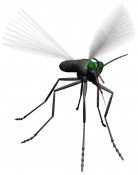Tuesday, August 4, 2009
Yesterday, the Mississippi State Department of Health reported the first death of the 2009 season due to West Nile virus. The deceased was from Washington County in the Delta. Three additional cases of the deadly disease were also reported yesterday, bringing the state's total cases to seven this year, including one in Hinds County.
Last year, three Mississippians died from the mosquito borne illness out of a total of 65 confirmed cases, making West Nile considerably more dangerous than swine flu. To date, the MSDH has confirmed 320 cases of swine flu with no deaths in the state.
As a healthy person, the risk of contracting West Nile from a mosquito bite is low, and most people who get bitten by an infected mosquito never develop symptoms. In more serious infections, patients experience common flulike symptoms: headache, body aches, fever, nausea and vomiting. Severe cases progress to seizures, paralysis, coma and possibly, death. If you experience flulike symptoms during the summer months, see a doctor immediately.
Other mosquito-borne diseases include St. Louis encephalitis (one Mississippi case reported so far this year) and Eastern Equine encephalitis. All of the illnesses affect humans and animals, including birds. In fact, birds are highly susceptible to West Nile, especially blue jays and crows, and dead birds are an early warning that infected mosquitoes could be present. The MSDH asks that you report dead birds by calling the West Nile hotline at 1-877-WST-NILE (1-877-978-6453).
You can prevent West Nile and other mosquito-born illnesses by eliminating the places where they breed, and using an effective repellent with DEET when outdoors, especially at dawn and dusk when mosquitoes are most active. Mosquitoes breed in standing water, so disposing or cleaning out areas where water collects is key to prevention.
For additional information on mosquito-borne illnesses, including prevention and protection tips, and information on birds, go to the MSDH Web site.

Comments
Use the comment form below to begin a discussion about this content.
Sign in to comment
Or login with:
OpenID